

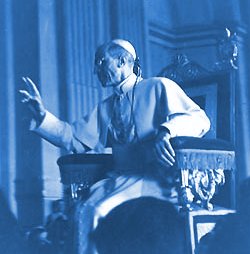 Pope Pius XII (p. 1939-1958) |
Historical revisionists vs. the Catholic Church
A little over two years have passed since the publishing of John Cornwell's book "Hitler's Pope" — a work which began the most popular and successful attack on the character of Pope Pius XII (p. 1939-1958). For years, Jewish "scholars" have blamed the Catholic Church for "propagating [the] culture of anti-Semitism" which led to the Jewish Holocaust, but such a general and abstract condemnation was not enough. The Catholic Church and its leaders needed to specifically implicated as well.
Since the release of Cornwell's book, the Media and other anti-Catholic groups have jumped at the opportunity to sacrifice Pope Pius XII and the Catholic Church for what is now considered to be the most reprehensible of crimes: cooperation with or indifference towards the World War II persecution of Jews.
There is little doubt that the true target of these efforts has been the Catholic Church, the particular Pope of the time being of little significance:
-
"Pacelli's failure to respond to the enormity of the Holocaust was more than a personal failure, it was a failure of the papal office itself and the prevailing culture of Catholicism." 1
Regardless of the legitimacy of the accusations against Pius XII, the very fact that they have been made has been enough to find him guilty in the court of public opinion. Unfortunately, most people won't take the time to study the facts and will assume that this is at least a legitimate issue, worthy of debate. It is not.
Revising recent history
Historical revisionism is becoming less of an exception than the rule, but it's discouraging to see events that occurred little more than a half century ago become so twisted. Small attempts to sacrifice Pius XII have popped up over the years but most have been disregarded by the non-Jewish world.
Former Nazi Rolf Hochhuth wrote a play in 1963 called "The Vicar" which portrayed Pius XII as an anti-Semite who chose not to stop Hitler. According to Hochhuth, Pius was primarily responsible for what he terms "collective guilt" — a guilt which is shared by every person on earth to varying degrees.2 Also circulating were number of conspiracy theories loosely based on the Pope's diplomatic activities before the war. During the First World War, the future pope Pius XII, Eugenio Pacelli, was sent by Pope Benedict XV to negotiate a confidential settlement agreement with Germany. It has been surmised that this was a start (or continuation) of a secret Papal-German alliance which effected the future actions and judgment of the Pope.
These pet crusades were ignored by all but the most virulent anti-Catholics. So what was different about Cornwell's book? Perhaps it was the timing. The present culture has been subjected to a number of elaborate Hollywood films, expensive museums and million-dollar campaigns spent convincing them that the Shoah was the most significant event in the history of mankind (and that we should all somehow feel "collective guilty" for it). Even the term "holocaust" has lost all meaning outside the German persecution of Jews. This despite the millions of Christians, Soviet POW's and Gypsies who met their death at Hitler's hands. This also despite the dreadful "holocausts" carried out by Stalin and Chairman Mao, which dwarfed anything Hitler ever accomplished.
Perhaps it was Cornwell's ability to present a unique angle filled with just enough mystery and intrigue to convince the masses:
-
"A noted commentator on Catholic issues, Cornwell began research for this book believing that 'if his full story were told, Pius XII's pontificate would be exonerated.' Instead, he emerged from the Vatican archives in a state of 'moral shock,' concluding that Pacelli displayed anti-Semitic tendencies early on and that his drive to promote papal absolutism inexorably led him to collaboration with fascist leaders." 3
Few tactics are more effective yet transparent then the "I used to be on his side" hoax, which gives any author a false sense of legitimacy. As if his findings and evidence were so compelling, he was forced (against his will) to come forward with this information. I suppose such a lucrative book deal was merely a fortunate but wholly unexpected consequence of his duty toward the truth. Please.
-
"'It gives a Catholic no satisfaction to accuse a Pope of acquiescing in the plans of Hitler,' Mr. Cornwell writes. Oh? On the contrary, it seems to give many Catholics satisfaction, not to mention profit. Can you imagine a major New York publisher or magazine welcoming a book in defense of Pius XII?" 4
Against a fact, there is no argument
Despite the numerous accusations, insinuations and conspiracy theories, one simple, irrefutable fact remains: no one did more to aid the persecuted Jews than Pope Pius XII.
-
"Pius XII was responsible for rescuing 860,000 Jews from certain death at the hand of the Nazis. In word and deed, Pope Pius XII was the best friend the Jewish people had during the Nazi effort to eliminate them." 5 (emphasis mine here and throughout)
"During the war, through his Pontifical Relief Committee, many war refugees were not only secretly lodged within the Vatican itself, but 15,000 were also installed in the Pope's own summer palace--Castel Gandolfo. Pius also instigated a full-scale underground safe passage operation that furthered the escape of those fleeing Nazi oppression with false papers, visas, etc. One case in point: In 1943 Pius channeled 55,000 Jews from Romania to Vatican asylum." 6
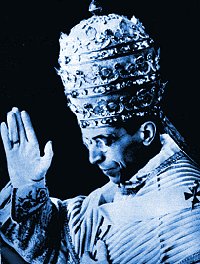 The Supreme Pontiff |
-
"Only the Catholic Church protested against the Hitlerian onslaught on liberty" 7
-
"...Zionists and anti-Zionists disagreed with each other on helping European Jews. The Zionists wanted to help only those Jews willing to go to Palestine and help establish the state of Israel." 8
-
"We have much documentation, which shows that in no way did he remain silent. What is more, he spoke out loudly against Hitler and almost everyone saw him as an opponent of the Nazi regime. During the German occupation of Rome, Pius XII secretly instructed the Catholic clergy to use all means to save as many human lives as possible.
"In this way, he saved thousands of Italian Jews from deportation. While 80% of European Jews died in those years, 80% of Italian Jews were saved. In Rome alone, 155 convents and monasteries gave refuge to some 5,000 Jews. ...
"For nine months, 60 Jews lived with the Jesuits at the Pontifical Gregorian University, and many others were hidden in the basement of the Biblical Institute. Following Pius XII´s instructions, risking their own lives, many priests and monks made possible the salvation of hundreds of Jewish lives." 9
Such examples of the Pope's stance during this difficult time go on and on. Secular articles, testimonies of prominent Jewish figures and even recently-released American CIA documents11 unanimously testify to the tireless efforts of Pius XII. But we needn't rely only on these sources — the actions of a single man say it all:
-
"Pius's saintly life is attested by the most authoritative character witness: Israel Zolli, chief rabbi of Rome during World War II.
"Under the personal influence of Pius, Zolli became a Catholic. Unlike many who converted in order to escape the Germans, he deferred his formal conversion until after the war, not wanting to abandon his people during their ordeal.
"But when the war ended, Zolli and his wife joined the Catholic Church, taking "Eugenio", Pius's Christian name, as their own baptismal name. As a priest recently remarked to me, 'He must have seen Christ in Pius.'
"Converting to Catholicism is a difficult step for a Jew, especially for one who holds a prominent position. And Zolli paid for it: he was widely reviled as a traitor to the Jews. One leading American rabbi even charged that he had been bribed to convert!
"It's inconceivable that Zolli would have honored Pius by taking his name if he had thought that Pius was in any way favorable to Hitler. After the war, in fact, many leading Jews praised Pius for his wartime protection and rescue efforts. One of them was a future Israeli prime minister named Golda Meir." 12
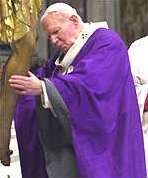 "We are asking pardon ... for the use of violence committed in the service of truth" -Pope John Paul II (St. Peter's Basilica, March 12, 2000)A 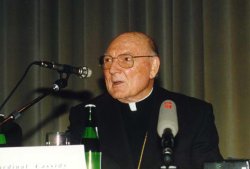 "Christians will acknowledge the sins committed by a not a few of their number against the people of the Covenant" -Cardinal Edward CassidyB |
An apology or admission?
Last year, Pope John Paul II commenced the Holy Lenten season with an apology, asking God's forgiveness for the sins of Roman Catholics through the ages, including especially those wrongs inflicted on Jews, women and "minorities". Since, he is certainly aware of Catholic Doctrine on forgiveness and knows that sins of those departed cannot be forgiven after death, this request was one of many unsubstantial "ecumenical" gestures that marred the Jubilee year.
Even if one takes no issue with such novel statements, the timing of this one was regrettable. As the "elites" of the world were fervently debating the nonsensical charges of Pius' "conspiracy" and "indifference" with regard to the Jews, this apology was understandably seen by the Church's adversaries as an admission of guilt.
Although the Vatican has issued statements defending the role of Pius XII during WWII, it is these surprising apologies along with the controversial books that receive the most publicity in the secular Media. With such limited and damning information, it is difficult to someone to come to the correct conclusion. BBC News reported on the apology with the comment that Israel's Chief Rabbi Israel Meir Lau had hoped the Pope would make a more specific apology and was "a little bit disappointed" that the Pope had made no mention of the Jewish Holocaust or the "controversial role of Pope Pius XII." 13 Such statements are all the "proof" most people need to convict the man.
Catholics should also be "a little bit disappointed" — disappointed that the Successor of Peter would take actions that appear to lend credence to anti-Catholic accusations. Numerous are the predecessors of John Paul II who would fervently avoid any actions or words that could even risk giving the appearance of cooperation with the Church's enemies. They knew that failure to reinforce the truth can give undue license to error. They recognized the importance of a strong, clear, unambiguous message in everything they said and did, and the Church benefited. There was absolutely no confusion or debate over what the Pope may have meant when he did this or said that. While one can (and Catholics should) attribute the best of intentions to the Holy Father, the fact that we even have to make such considerations is extremely unsettling.
The interreligious commission
Thinking (as new ecumenists tend to do) that the best way to determine the truth on this "issue" is for Catholics and Jews to work together, a committee was established on October 18, 1999 comprised of three Catholic and three Jewish "scholars".
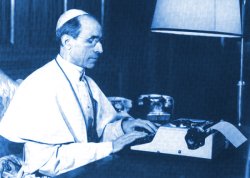 Given the reaction to Pius XII's supposed silence during the Jewish holocaust, it will be interesting to see how a future society which has embraced Christ and shed the barbarism of abortion will treat our current Catholic bishops' lack of action against the abortionists. |
This "ecumenical" solution turned out to be a disaster as the Catholic and Jewish members could not reach a consensus on practically anything. They would all read the same facts and come to different conclusions. The Jewish side would base all research upon the conclusion that the Pope was guilty of cooperation or indifference, so everything they came across was analyzed in that light. The Catholic members were more objective in the matter and stated a willingness to entertain all ideas (presumably even anti-Catholic ones), but were unable to see how their Jewish counterparts could come to the conclusions they did.
One particular sticking point for the Jews was their assumptions on the information they did not have. Although the commission was specifically called to study and report on only the available records, the Jewish members immediately turned their focus towards the volumes of unpublished documentation in the Vatican, asserting that Pius' guilt lay in those records and no accurate study could be done without them. After the Vatican refused access, due to the sensitive nature of some of the information (particularly with regards to sacramental and internal affairs), the Jewish committee members embarked upon a public slander campaign, accusing the Vatican of concealing secrets. Their efforts gave even more support to the prevailing paranoia of a Vatican conspiracy and cover-up.
This ill-conceived commission was suspended last August due to "feelings of mistrust" and "divergences of interpretation". It was so bad, that even the committed ecumenist Cardinal Walter Kasper was forced to abandon his usual denial and admit to the:
-
"...impossibility of overcoming the divergences of interpretations regarding the duties and objectives of the study group ... indiscretions and polemical writings on behalf of the Jewish members contributed to cause a feeling of mistrust, making it practically impossible to continue joint research." 14
Sacrificing the papacy
Pope Pius XII is considered by most to be the last in a line of "imperialistic" Popes. He was the last to practice and embrace all the outward signs of the Papal Monarchy and his was the final pontificate before the "renewal" of the Second Vatican Council. The last time Modernists and liberal "theologians" had to exercise caution, fearing exile was under Pius XII. Soon afterwards, Pope John XXIII would specifically invite some of these same individuals to play an influential role as periti (advisors) at Vatican II.
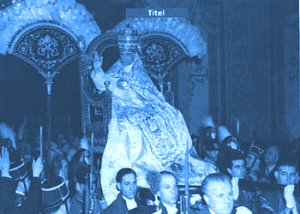 Pius XII with Tiara and Sedalia |
As previously mentioned, the attacks on this Pope are no less than attacks on the Catholic Church and the authority which the Supreme Pontiff so fully embodies. It is quite telling that John Cornwell (the "Catholic" with the grave moral obligation to slander Pius XII) began his book by giving a simplistic history lesson depicting the Catholic Church as an evil institution for its suppression of the Modernist "truth-seekers". From this perspective, it is not too surprising that many modern Catholics have joined this popular slander, or at least participated in a "collective apology". Most feel no real connection between the "renewed" Church of today and the regrettable Church of old, which they also see as "responsible" for the Crusades and the Inquisition.
This is a welcomed attack on a man and a time which represented everything liberals despise about the Church — centralized authority, unchanging doctrine and absolute morals. It is a repudiation of a Divine Institution — an attack that is renewed every day by dissent towards the values taught and proclaimed by the Church. In this manner the infidels, heretics and liberals have been able to find common ground: a strong Papacy is evil.16
Pope Pius XII did more and sacrificed more than any man alive to save Jews during the reign of Hitler. He deserves much better, but unfortunately is already well on his way to becoming yet another tragic figure, sacrificed to the gods of public opinion in the ongoing effort to trample the Catholic Church.
Peter Miller
Seattle, WA
12/14/2001
|
FOOTNOTES: 1 J. Cornwell "Hitler's Pope: The Secret History of Pius XII" Viking Press (1999) 2 Fr. K. Baker, "The Jews' Best Friend", Homiletic and Pastoral Review (11/2001) 3 W. Smith, Amazon.com (1999) 4 J. Sobran (1999) 5 R. McInerny, "The Defamation of Pius XII", St. Augustine's Press (2001) 6 H. Seitz, "In defense of Pius XII" America (10/12/1996) 7 J. Sobran "For the Record" (9/25/2001) 8 Fr. K. Baker, "The Jews' Best Friend", Homiletic and Pastoral Review (11/2001) 9 ZENIT, "Pius XII Saved More Jews than Schindler, Rabbi Says" (9/29/2001) 10 A. Tornielli "Pius XII, Pope of the Jews" (2001) 11 CWNews, "CIA Archives Show Pius XII Saved Jews, Actively Opposed Nazis" (9/5/01) 12 J. Sobran (1999) 13 BBC News, "Pope's apology not enough - rabbis" (3/12/2000) 14 EWTN News, "Cardinal Says Mistrust, Polemics Doomed Holocaust Commission" (8/25/2001) 15 CWNews, "Two Jews Resign from Suspended Vatican Commission" (11/2/2001) 16 In reading Ut Unum Sint, one may think the Pope would tend to agree. A BBC News, "Pope's apology not enough - rabbis" (3/12/2000) B Ibid. |

